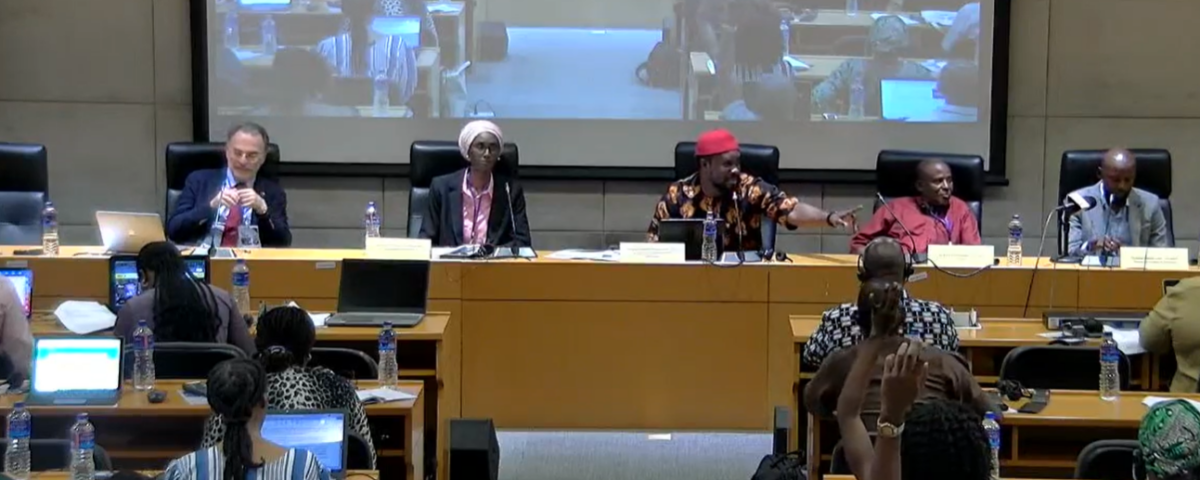In an era where digital connectivity shapes our lives, the conversation around digital rights has never been more crucial. As governments increasingly resort to internet shutdowns and censorship, the need to protect these rights becomes paramount. The panel discussion at the NGOs Forum preceding the 81st Ordinary Session of the African Commission on Human and Peoples’ Rights (ACHPR) in 2024 brought together key stakeholders to explore the challenges and opportunities in advancing digital rights across Africa. Moderated by Chinedu Gbulie, Communication Officer at Avocats Sans Frontières France, this enlightening dialogue underscored the imperative of ensuring that access to information through digital platforms is recognized as a fundamental human right.
The discussion featured prominent voices, including Ms. Neneh Cham, Dr. Y.Z. Ya’u, and Boubacar Demba Couly, who shared their insights on the current landscape of digital rights in Africa, emphasizing the urgent need for comprehensive legal frameworks and advocacy to safeguard these essential freedoms.
Ms. Neneh Cham, President of the Gambian Bar Association, asserted that digital rights are integral to human rights, protected under principles that govern everyday interactions. She cited Article 19 of the ICCPR and the African Charter, particularly referencing the 2019 Declaration, alongside national constitutions that guarantee freedom of expression. Cham pointed out the absence of specific digital rights legislation in The Gambia, where journalists and human rights defenders face prosecution under the criminal code for online criticisms. She recounted the case of Madi Jorbateh, who was arrested for his online critiques, and another incident in Nigeria involving a woman whose phone was confiscated while livestreaming police brutality. Although a court recognized her rights were violated, it did not affirm her right to access digital spaces explicitly. Cham concluded by discussing the significant challenges posed by restrictive laws on freedom of expression and digital rights, advocating for a comprehensive digital legal framework that balances these rights with national security concerns through inclusive and consultative processes.
Dr. Y.Z. Ya’u, Executive Director of CITAD, raised concerns about information overload in the digital landscape. He emphasized that while digital platforms can enhance access to information, many people remain digitally excluded due to high costs and limited accessibility. Notably, over 37% of Africans are online, leaving a large majority offline, with women disproportionately affected by this exclusion. Dr. Ya’u criticized government-imposed internet shutdowns that further limit access and highlighted the inadequate capacity of National Human Rights Institutions (NHRIs) and judicial systems to protect digital rights. He called for increased awareness-raising and advocacy to ensure individuals are informed about their digital rights and stressed the necessity for a safer online environment for all users, particularly women and marginalized groups.
Boubacar Demba Couly, Executive Director of Gambia Tech Project, underscored the importance of raising awareness about digital spaces to empower individuals to leverage their potential for improvement. He argued for an enabling environment that allows stakeholders to fully utilize digital opportunities, noting that current regulatory frameworks are insufficient for fostering a digital mindset. Couly pointed out that governments often act as primary “cyberbullies,” interfering with internet access through restrictive laws. He advocated for providing internet access at schools to support children’s education and emphasized building capacity among individuals to navigate online challenges effectively. Couly concluded by urging civil society organizations (CSOs) to focus on advocacy and awareness creation surrounding digital rights.
During the discussion, participants voiced various concerns:
- A participant from Mali highlighted the challenge of navigating a digital space filled with toxic information.
- A participant from Cameroon noted increasing government restrictions on digital rights, citing prohibitions against discussing presidential health.
- A participant from South Sudan emphasized cybersecurity’s importance in preventing government surveillance, sharing personal experiences of social media hacks.
- A lawyer from Kenya called for legislation to prevent abuses of digital rights.
- A participant from Algeria discussed self-censorship due to state pressure, stressing the need for collective advocacy against such restrictions.
This panel discussion served as a critical platform for addressing the pressing issues surrounding digital rights in Africa, highlighting both challenges and opportunities for advocacy and reform.


